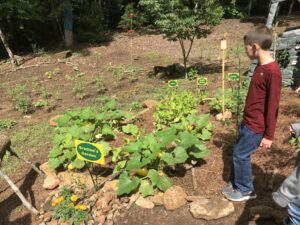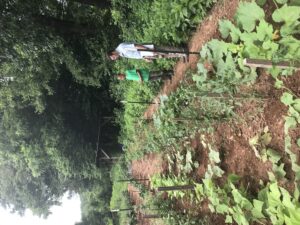Get Growing With the Young People in Your Life
go.ncsu.edu/readext?858438
en Español / em Português
El inglés es el idioma de control de esta página. En la medida en que haya algún conflicto entre la traducción al inglés y la traducción, el inglés prevalece.
Al hacer clic en el enlace de traducción se activa un servicio de traducción gratuito para convertir la página al español. Al igual que con cualquier traducción por Internet, la conversión no es sensible al contexto y puede que no traduzca el texto en su significado original. NC State Extension no garantiza la exactitud del texto traducido. Por favor, tenga en cuenta que algunas aplicaciones y/o servicios pueden no funcionar como se espera cuando se traducen.
Português
Inglês é o idioma de controle desta página. Na medida que haja algum conflito entre o texto original em Inglês e a tradução, o Inglês prevalece.
Ao clicar no link de tradução, um serviço gratuito de tradução será ativado para converter a página para o Português. Como em qualquer tradução pela internet, a conversão não é sensivel ao contexto e pode não ocorrer a tradução para o significado orginal. O serviço de Extensão da Carolina do Norte (NC State Extension) não garante a exatidão do texto traduzido. Por favor, observe que algumas funções ou serviços podem não funcionar como esperado após a tradução.
English
English is the controlling language of this page. To the extent there is any conflict between the English text and the translation, English controls.
Clicking on the translation link activates a free translation service to convert the page to Spanish. As with any Internet translation, the conversion is not context-sensitive and may not translate the text to its original meaning. NC State Extension does not guarantee the accuracy of the translated text. Please note that some applications and/or services may not function as expected when translated.
Collapse ▲In my childhood, I loved to play outside in my parents’ garden. There was nothing quite like finding shining small insects scurrying from leaf to leaf. Just seeing that sight was enough to pique my curiosity and nudge me to reach for a book to find out what their role was and how they ended up in our little garden. With that experience in my pocket, it wasn’t a stretch for me to start investing time in our plants. Watching the plants grow, watering them, making sure that they had what they needed to grow, and finally, harvesting them, was all such rewarding work. Cherry tomatoes and radishes were my favorite because they were so satisfying to pull off the plant and out of the ground.

That little garden taught me a lot of lessons about patience, observation, and curiosity. I ran experiments to see what would happen with the plants and insects. Like a tiny explorer on an expedition, I had my hands full with the tools of my trade. I carried my magnifying glass, my big book of insects, and an insect-carrying case around with me whenever I went out to explore my yard. All of this preparation was so I could figure out what creatures I was cohabitating with outdoors. There was pride in what we grew at home, at the fact that I could run out to our garden and return with a hand full of herbs to transform our dinner or an arm-full of ripe red tomatoes. Our garden area was pretty small in the grand scheme of garden spots, and yet, even the raised beds that we had to grow in, impacted me. Being able to help my parents with the garden, to decide what we planted, and work together on it all made me feel connected to something bigger than myself. It helped me understand that we are all connected to one another and the earth.
As I’ve worked in horticulture and participated in gardening programs for kids and adults, I’ve had a chance to read about the benefits of gardening for kids and how to make the most of the garden space for educational purposes. There are so many benefits and lessons that can be learned through the act of caring for another living entity, seeing the entire lifecycle play out, and being able to enjoy the bounty of the harvest. Gardens can be places to foster creativity, curiosity, and problem-solving skills, in addition to engaging children in the realities of physically hard work, which builds appreciation for those who grow foo. They can also serve as an exercise in mental decision-making processes. Deciding what to plant, where to plant it, how to care for it, and many other garden-related decisions can be made with children so they feel included and can see the impact of their actions.
Math and science lessons can be incorporated at all points of gardening, both formally and informally. Some examples include: counting flowers, measuring out plant spacing, planning what to plant based on harvest estimations, determining fertilizer calculations, and more. Kids can keep a garden journal and practice both scientific writing and creative narrative writing. The physical activities of gardening are beneficial to kids as well as the mental ones. Gardening is hard work and is great for muscle development and strength. There are other simple pleasures that can come from gardening, like the feel of soil in your hands or the rich scent of a garden after the rain. Recent studies also point out that regular exposure to soil and its biomes can improve the immune system functioning in children. There are also trends in the lower levels of anxiety in both adults and children who garden regularly.
Gardening can be done in a few raised beds, in containers on your porch, or in an in-ground garden that feeds your whole family (and maybe even your neighbors and friends too). If you have a garden that grows more than what your family needs, sharing your produce with others is another great way to teach lessons of community sharing to your kids as well. Sometimes when our home garden had a bountiful harvest, I used to set up a little vegetable stand in front of my yard with items I found in our garage to sell our extra vegetables to our neighbors. Nothing like being a tiny salesperson to help with social skills and problem-solving! The possibilities and benefits of gardening with your children are truly endless. Not to mention the fact that kids who garden have been shown to be more willing to eat fruits and vegetables, especially those that they helped to grow. This also makes them more likely to seek out fruits and vegetables as adults, resulting in a lower likelihood of developing diet-related diseases. Gardening can be a life-long companion which provides fruits in both your physical and emotional life.
To foster youth gardeners’ development and gardening enthusiasm this summer, the Master Gardener class of 2022 is hosting the ‘Growing Gardeners: Roots and Shoots’ program for young people ages 9-13. This program will include all the starting gardening supplies needed, a kickoff event with assistance and instruction on how to get their garden growing, and mentor visits to the garden to troubleshoot and celebrate all of the gardeners’ accomplishments. We’ll end the summer season with a celebration event. No previous gardening experience is necessary, all that is needed is a bit of sunny space outside and a willingness to learn and explore. To learn more, or register for the program, visit the Extension Office, or our website (rutherford.ces.ncsu.edu). Sign up for the summer gardening program is available through our office and online via Eventbrite.





